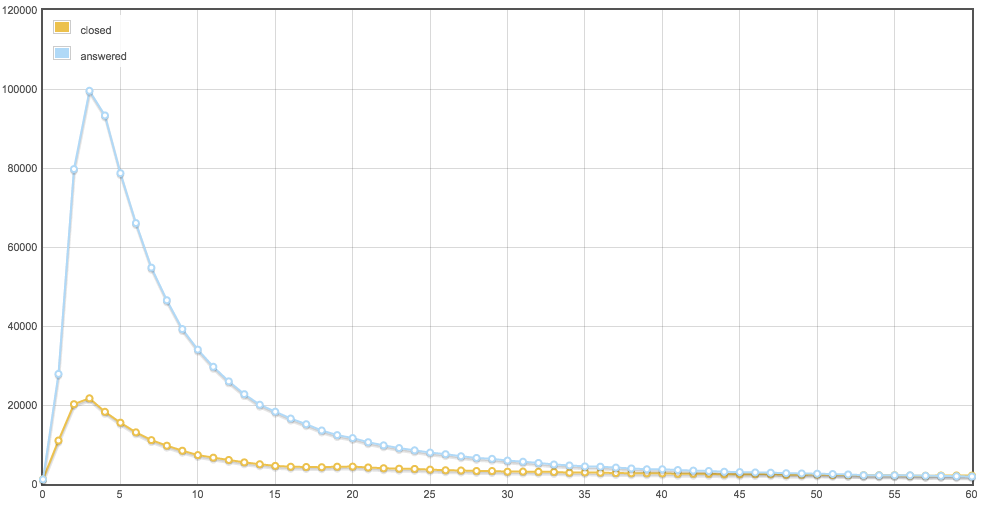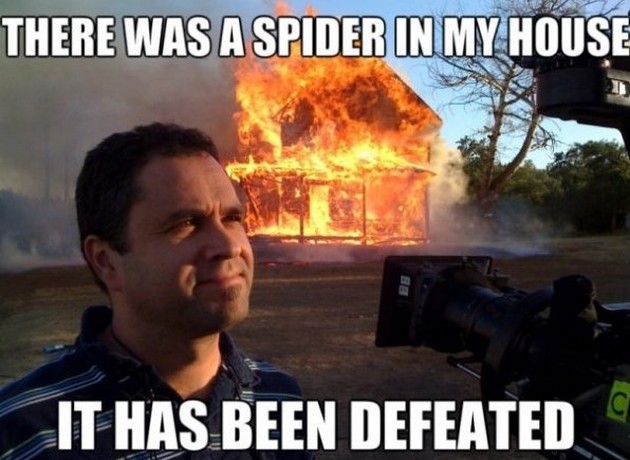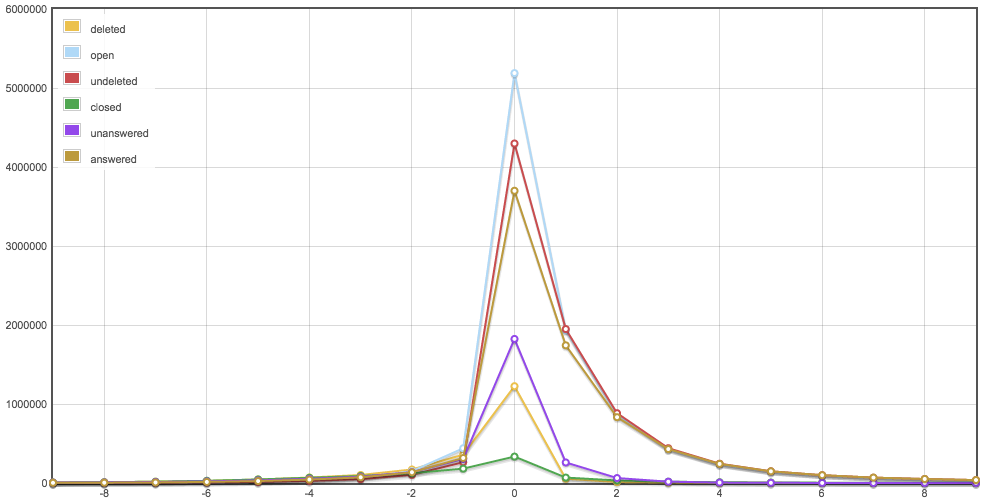I have a few thoughts about this, which I've organized under roughly-independent headers...
The literal answer
First, it's worth noting that Stack Overflow had the notion of closed questions before it had the concept of close votes. So it's not necessarily true that "no close votes" would equal "no closed questions".
Given the rest of your question, I'm pretty sure this isn't what you were thinking about when you wrote this... But I think it's important to remember the history of these features: it's all too easy to get stuck in "cycles" when designing systems like this, trying the same things over and over again, reacting to each new problem by returning to a previous solution that was discarded due to other problems. More on this later...
I recently posted statistics on how questions are being closed now. Let's contrast that with stats on how questions were being closed in the 3 months before close-voting was implemented (2008-09-30 to 2008-12-30):
Total questions closed
----------------------
2189
(1 row(s) returned)
Total questions asked PctClosed
--------------------- ---------
47156 4.64 %
(1 row(s) returned)
Name Closed Closed->Edited Closed->Reopened Cl->Ed->Re
------------------- ---------- -------------- ---------------- ----------
exact duplicate 707 304 6 3
not a real question 310 35 1 1
not constructive 86 16 1 1
off topic 1042 126 28 8
too localized 44 6 1 0
(5 row(s) returned)
% of Closed Name Closed->Edited Closed->Reopened Cl->Ed->Re
----------- ------------------- -------------- ---------------- ----------
32.3% exact duplicate 43.0% 0.8% 1.0%
14.2% not a real question 11.3% 0.3% 2.9%
3.9% not constructive 18.6% 1.2% 6.3%
47.6% off topic 12.1% 2.7% 6.3%
2.0% too localized 13.6% 2.3% 0.0%
(5 row(s) returned)
...and the three months following it (2008-12-31 to 2009-03-31):
Total questions closed
----------------------
2444
(1 row(s) returned)
Total questions asked PctClosed
--------------------- ---------
62703 3.90 %
(1 row(s) returned)
Name Closed Closed->Edited Closed->Reopened Cl->Ed->Re
------------------- ---------- -------------- ---------------- ----------
exact duplicate 586 212 18 8
not a real question 432 81 2 1
not constructive 176 35 2 0
off topic 1211 193 20 2
too localized 39 6 0 0
(5 row(s) returned)
% of Closed Name Closed->Edited Closed->Reopened Cl->Ed->Re
----------- ------------------- -------------- ---------------- ----------
24.0% exact duplicate 36.2% 3.1% 3.8%
17.7% not a real question 18.8% 0.5% 1.2%
7.2% not constructive 19.9% 1.1% 0.0%
49.5% off topic 15.9% 1.7% 1.0%
1.6% too localized 15.4% 0.0% 0.0%
(5 row(s) returned)
Probably the most striking change there is the reduction in the number of duplicates closed (and duplicates as a % of closed questions). Even though the system didn't even require finding a link for duplicates during this period, dup-closing was already harder than closing for any other reason. As a % of questions closed, duplicates continued to drop for some time after this, finally experiencing a resurgence with the introduction of Thor's Hammer.
Finally, please go read Mike Stone's blog post about closing (also referenced in the "love-hate" blog post you cite). This post - and an ensuing email conversation between Mike & Jeff - are credited with motivating the creation of the vote-to-close system we all... uh, the system that exists today. It's worth reading just for the similarities between the complaints raised against Stack Overflow now and those tossed around 6 years ago...
Satan's Solicitor
Oh, tell me I may sponge away the writing on this stone!
Ok, now let's get back to the question you actually meant to ask: what would happen if closing - as a concept - didn't exist?
I'm not going to try to estimate actual numbers for anything here; this would be a massive change, affecting too many variables for me to even enumerate with confidence much less account for. I've provided numbers elsewhere for how many questions get closed today, as well as how many get deleted - those are useful for getting a rough idea of the scale involved here.
For starters, we could strip a lot of complexity from the system:
A huge number of votes, flags, scheduled tasks and associated plumbing could be discarded. No more close review, no more "recommend close" flags, Very Low Quality flags for questions could be handled the same way as they are for answers (n high-rep delete votes or n×2 low-rep reviewer delete recommendations).
No more tedious discussions about what close reasons we need, how to best convey such information to new users, what sorts of documentation we should be providing to help explain closures or motivate editing on the part of the askers.
No more reopening. No more reopen queue, no more scheduled tasks looking for edited or popular posts to reopen, no more aging away reopen votes.
No more public moderation; no more revenge-voting everyone who closed your question. The names of downvoters are not included in public data, and deleted questions (along with information on who deleted them) are excluded from both Google and SEDE.
In short, a massive amount of technical and bureaucratic overhead would be removed, blasting away a whopping 40% of the steps outlined in The Question Lifecycle.
And those are just the direct effects. The secondary effects are even better:
No comment discussions about question closure. Sure, there'd be discussions about question downvoting, but those already exist - and given that downvotes are anonymous, there's little motivation to come back and revisit questions you've downvoted to avoid having your name attached to something that doesn't warrant the vote. Unless you're coming back to vote to delete... But comments aren't allowed on deleted posts.
Automatic deletion could be greatly simplified; without closed questions, the notion that there should be a "grace period" for editing in order to allow questions to be salvaged becomes trivial: if there's no activity on a poorly-received question for some amount of time, just remove it.
Deletion in general would be greatly simplified: current restrictions are all based around a combination of question+answer score and closed date; without a closed date, deleting questions becomes as simple as deleting answers: find a worthless post -> make sure it's downvoted -> vote to delete.
No closed questions in search results. That "love-hate" blog post made some hay on the closure of a question back in 2011, but we get relatively few complaints about deleted questions - no one finds them! There are a lot more deleted answers than there are closed questions, but far fewer complaints - again, because no one sees them. If the only choice was to leave questions fully accessible or delete them, we'd eliminate a massive source of complaints in exchange for a few more answers to poor questions.
With no way to close duplicates, the conflict between folks who like to identify and close common questions and those who prefer to identify and answer common questions goes away: both sides can just post answers, one with links and one with copypasta.
With no way for the system to even identify duplicates, current restrictions on deleting them (by automated systems) or deleting dup-targets (via votes) become obsolete as well. Vast swaths of ugly questions, no longer needed to point the way toward an answer, can be removed.
All in all, a close-free Stack Overflow would be a much, much simpler, significantly less boisterous system. There would be a few downsides of course:
There'd be no path short of moderator intervention for getting rid of popular distractions.
With downvotes now the primary means of moderating questions, the number of "moderators" would increase by more than 10x. With downvotes now the only means of marking problematic questions, their use - along with flags - would likely see a marked increase, along with "lord of the flies" comparisons such as our dear "love-hate" author's. Note that Stack Overflow current sees more close votes + flags on questions than it does downvotes on questions and answers combined.
We - that is, the community here on meta, the elected moderators, and the folks like you and me working for Stack Exchange - would lose a powerful tool for influencing moderation: predefined close reasons.
Along the same lines, there'd no doubt be considerably more pressure to require downvoters to specify a reason for downvoting, along with calls for meta-moderation features that could invalidate downvotes that were seen as groundless by some segment of the population.
A very different system indeed...
The answer that isn't an answer
Both of the previous answers assume that there's a limited scope to this exercise, that we're cutting out one section of the question pipeline and sewing the ends of what remains back together like some sort of weight-loss surgery. In other words, I'm assuming we would not want to completely strip the concept of community moderation from Stack Overflow, Lord of the Flies comparisons notwithstanding.
But of course, that's an assumption that only makes sense here. Out in the wild and woolly world of weblogs, plenty of pundits propose exactly that - and have been since the start. When I read,
So what if some of the questions are not as good as others, and don’t perfectly fit into Stack Overflow’s long-term archive? Let people ask them, let these questions get answered. And if they’re mediocre questions, let them fade into mediocrity after a few weeks.
...I'm reminded of a question Michael Pryor pointedly posed nearly six years ago, "Why do people close questions on Stackoverflow?"
Closing a question is effectively saying "You can't talk about that here". Why do you care? What are you attempting to accomplish by closing the question?
My reply then - and now - was that you can't have a community without something shared to hold it together:
We're not a community in the traditional sense; we don't hold pancake breakfasts or sponsor 10K run/walk events, and the number of people who bother to meet off-line or even talk outside of SO is small and heavily fractured. This community is, at its core, one of shared purpose[...]
It doesn't matter if the underlying system supports multiple groups of users; without that core group and a common goal, you have nothing.
This - the notion of a shared goal - is the source of an underlying conflict that can never be resolved conclusively without fundamentally changing what Stack Overflow is. You could easily build a system that allows any question on any topic, and even things that aren't really questions about topics that aren't really defined, and others have built systems that do exactly this...
But that isn't what we've built here. I, for one, enjoy not seeing my work lumped in with discussions of pop stars or GTKY threads about food. If you like that sort of thing, great! There are places that will cater to you - we don't need to be everything to everyone. Heinz made 57 varieties of pickles yet he did not please all of the pickle lovers...
Love-hate gets so many things right that I'm reluctant to keep picking on individual quotes... But the mistake I see over and over again is the same mistake I've been seeing here for 6 years, repeated ad nauseum by countless members new and old: focusing on flaws in portions of the system without seeing how those pieces fit into the whole.
I spent the past weekend fixing the ignition system in a 30-year-old riding lawnmower. The previous owner hit on what I suppose seemed a very clever idea: replace the broken ignition system with a push-button start. He accomplished this by wiring the battery to a button and the button directly to the solenoid, bypassing everything else. And it worked! At least, it ran, and the lights turned on and off. Of course, the lights just drained the battery, which the alternator no longer charged, and the only way to turn the thing off was to stall it... But hey, it cut out loads of complexity and got rid of those safety switches everyone loves to complain about!
And this is the problem you run into when you start "fixing" things by cutting out parts without first bothering to understand the problems they were intended to solve: you inevitably find yourself - or whoever comes after you - having to solve those problems again:
Discouraging comments: make answering the path of least resistance, avoiding the "need to read 30 pages of forum replies to get a complete answer" problem.
Rewarding clear, reusable questions: allow answers to be reused, meaning knowledge isn't trapped forever in a thread no one can find.
Closing unclear, unwanted or apparent duplicate questions: nominate and vet deletions in public, where they can be reviewed by the entire community, discussed and even avoided completely.
Are there other ways to solve these problems? Absolutely! Could we try them? Should we? Yes! Yes! And we have, and we'll continue to, aided and motivated by discussions such as this one. But we'll do so fully aware, not just of the problems that remain unsolved, or the side-effects of our current solutions, but also of the original issues that these systems were created to solve in the first place. When I finished the wiring on that lawnmower, it was still a push-button start - but now it charges the battery, and shuts off if you should fall from the seat with the blades running. Yes, it took a lot longer to analyze and implement than the original hack - but the result is something that can continue to run for years to come. Stack Overflow is now in its 7th year, and there's no reason why it can't be made to operate for much longer - if we take similar care of repairs.
In closing
At some point, this discussion stops being about the tools we use and starts being a question about the essential nature of what we're doing...
Is this still a collaborative effort, a great leap of faith predicated on trusting your fellow programmers? Is Stack Overflow you? Or are you just canon fodder, a digital sharecropper to be milked for all you're worth and then cast aside.
And for those of us here on meta, building this system... Who are we building it for? Do we still remember?



avg(score)it might be useful to reexamine the 'average' numbers with the inner quartile mean instead. which should reduce the impact of those very highly scored historical questions and answers.